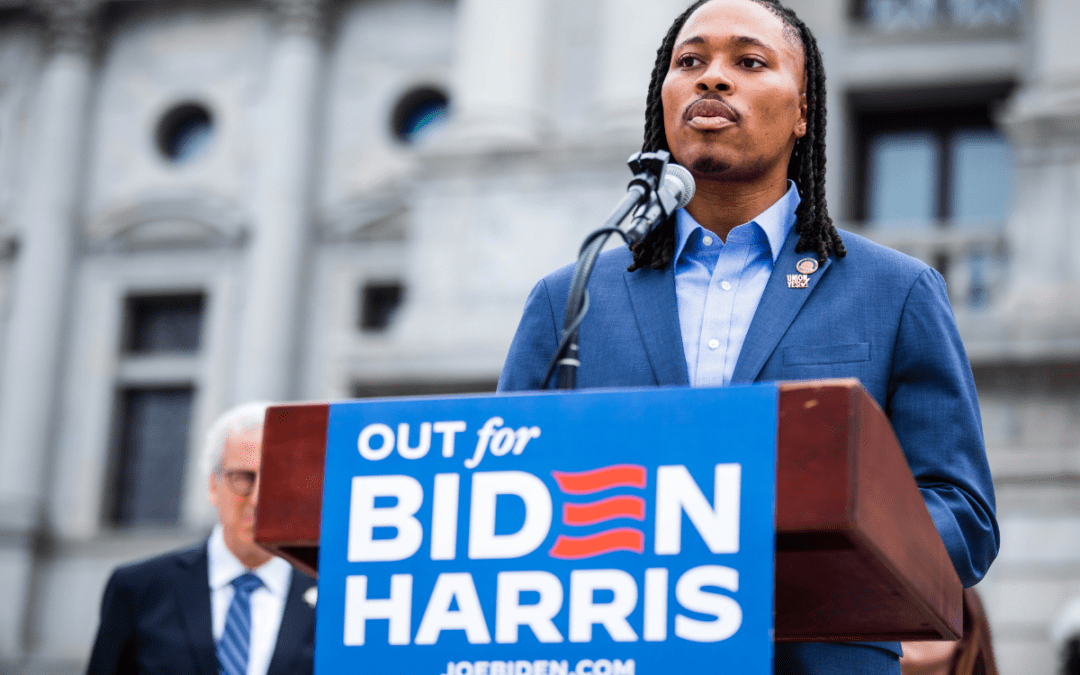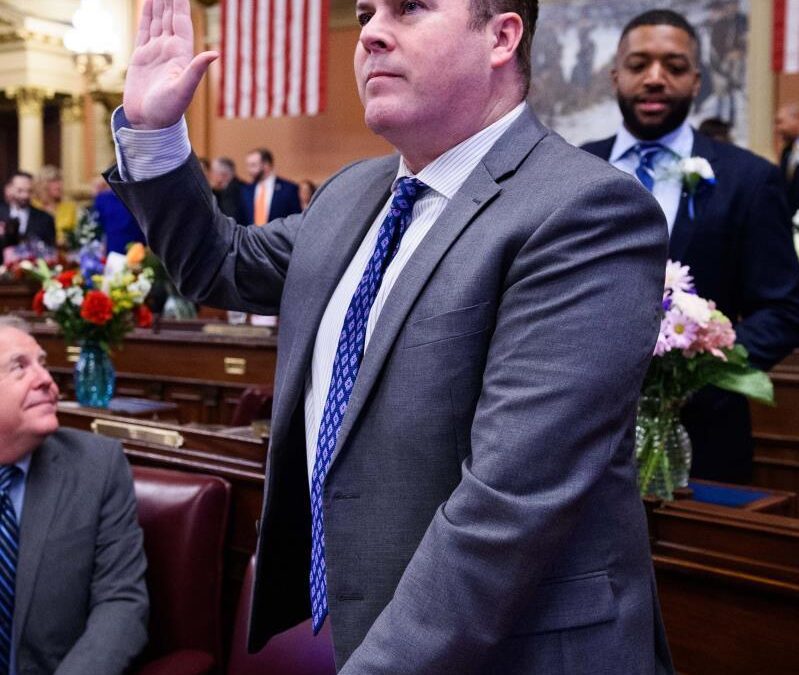
FILE - In this Jan. 6, 2021 file photo, Trump supporters participate in a rally in Washington. Trump is casting the Jan. 6 insurrection at the U.S. Capitol as a patriotic act. As part of this, Trump is attempting to spread suspicions about the circumstances of the death of Ashli Babbitt, who was in the pro-Trump mob that day. (AP Photo/John Minchillo, File)
The findings come as the US House Committee investigating the Jan. 6 attack will hold the first of six public hearings Thursday night in primetime. Sixty-five percent of voters support the House investigation, while only 28% oppose it, according to a new Courier Newsroom/Data for Progress poll.
Nearly 18 months after supporters of former President Donald Trump launched a deadly siege on the US Capitol and tried to overturn the 2020 election results, polling shows that voters remain concerned about the long-term impact of the Jan. 6 attack–and want accountability.
A new Courier Newsroom/Data for Progress poll finds that 61% of likely voters are “very” or “somewhat” concerned that Trump Republicans will promote violence to achieve political goals in future elections. Another 10% are a “little concerned” about the possibility. Only 29% of voters say they’re not concerned at all.

The findings come as the US House Committee investigating the Jan. 6 attack will hold the first of six public hearings Thursday night in primetime.
The hearings are expected to delve into many different aspects of the investigation, including Trump’s promotion of the “Big Lie” that the 2020 election was stolen, his attempt to pressure Vice President Mike Pence to illegally throw out electoral votes for then President-elect Joe Biden, his calls for supporters to assemble in Washington D.C. to “Stop the Steal,” and his failure to call off the violence for more than three hours after the attack on the Capitol began.
Trump’s Republican allies have tried to dismiss the hearings and the House investigation as political gamesmanship, but voters aren’t buying it. Roughly two-thirds of voters (65%) support the House investigation, while 28% oppose it.

The survey also found that most voters blame Trump for what happened on Jan. 6 and believe he should be held accountable.
- When reminded of what happened in the weeks leading up to Jan. 6, 57% of voters said Trump bears “a lot” or “some” responsibility for the attack. Twenty-nine percent said he bears no responsibility at all.
- Fifty-six percent of voters believe individuals and groups—including elected officials like then-president Trump—who helped fuel the attack should be held criminally responsible for what happened that day.

The hearings are also expected to highlight efforts by Trump’s allies to help keep him in office or return him to office after Biden was inaugurated.
Since Election Day 2020, Republican lawmakers across the country have tried to discredit or overturn the election results. Eight of the nine Pennsylvania Republicans in the US House joined 131 other House Republicans in voting to overturn the 2020 election results.
One of those lawmakers, five-term Dauphin County congressman Scott Perry, has been a target of the Jan. 6 committee for months.
In December, the committee requested an interview and phone records from Perry, in hopes of obtaining information about meetings Perry had with Trump prior to the attack on the US Capitol where they discussed strategies about how to block the results at the Jan. 6 electoral count. Perry denied those requests.
Perry also refused to show for a scheduled deposition late last month, with his attorney sending a five-page letter to the Select Committee reiterating Perry’s belief that the committee has overstepped its authority and that the subpoena was not properly served making it null and void.
More insidious have been the actions of state lawmakers.
A recent New York Times analysis of nine key swing states, including Pennsylvania, found that 357 sitting Republican politicians—amounting to 44% of all Republican legislators across the nine states—have used the power of their office to discredit or try to overturn the 2020 election results.
In Pennsylvania, that number is even higher–78% of Republican legislators have taken such actions, which include attempts to delay the vote count, support for lawsuits intended to overturn the election, support for sending alternate slates of electors to Congress (to override the will of voters), and attempts to manually decertify election results—an idea that is actually impossible, according to experts.
Fifty-six percent of voters oppose these efforts, while 33% support them. However, a majority of Republicans polled (54%) approve of such proposals, highlighting the lasting and corrosive impact of the “Big Lie.”
The foremost leader of these efforts has been state Sen. and Republican nominee for governor, Doug Mastriano (Franklin).
Shortly after then-candidate Joe Biden defeated former President Trump in the 2020 election in Pennsylvania, Mastriano got to work promoting lies about voter fraud and trying to overturn the election results. He was also in communication with an appointee in Trump’s Department of Justice regarding his false claims of voter fraud.
In December 2020, Mastriano appeared on the QAnon-focused program, The Common Sense Show, where he compared his effort to overturn the election to fighting against the terrorists on Flight 93 and opposing the rise of Adolf Hitler.
Mastriano continued to spout violent rhetoric and lies about voter fraud in the lead up to the Jan. 6 insurrection at the US Capitol and said Republicans “don’t even realize that, you know, basically we’re in this death match with the Democrat Party.”
He also paid for people to bus down to Washington, DC for the Jan. 6 “Stop the Steal” rally and was also present at the protest himself, which led to the insurrection at the US Capitol—an attack on American democracy that resulted in five deaths. Mastriano said he condemned the violence and never entered the Capitol, but footage shows he was on the Capitol lawn.

Since Jan. 6, Mastriano has doubled down on trying to overturn the 2020 presidential election results in Pennsylvania, calling for a “forensic investigation” of the state’s election results. State Senate President Pro Tempore Jake Corman (R-Centre) removed him from leading the investigation after disputes over how to run it.
Mastriano was subpoenaed by the Jan. 6 committee in February, only to skip his scheduled deposition in March. Last week, it was announced that Mastriano had finally agreed to speak with the committee.
According to Mastriano’s lawyer, Timothy Parlatore, Mastriano was already interviewed by the FBI last year. He told them he did not know about a planned insurrection or any coordination behind the Jan. 6 attack on the US Capitol.
“He previously was approached and sat for a voluntary interview with the FBI and told them the truth about everything that happened that day,” Parlatore said. ”The FBI cleared him.”
Parlatore said he provided documents to the House Committee last week and made the offer of an interview months ago. Mastriano has nothing to hide, Parlatore said.
But according to a report from Politico, Mastriano was not required to provide the committee with any materials related to official actions in his current position as a state senator. So much of what Mastriano has delivered is information already made public, such as social media posts.
The committee has yet to schedule an interview with Mastriano.
While Republicans have repeatedly cried voter fraud, they’ve failed to provide legitimate proof to back up their claims, and an enormous body of evidence shows there was no widespread fraud during the election.
A December 2021 Associated Press analysis found that Pennsylvania election officials identified only 26 cases of potential voter fraud, representing 0.03% of Biden’s margin of victory.
While efforts behind the “Big Lie” have repeatedly failed, they’ve achieved a destructive impact on Republicans’ faith in elections. A majority of Republican voters now do not believe Biden was legitimately elected, despite ample evidence to the contrary. Furthermore, supporting Trump’s “Big Lie” has become a litmus test among Republican base voters. The former president has spent much of the past year endorsing candidates who embraced his lies and discredited his 2020 loss.
It’s still a toss-up as to whether repeating the false narratives about 2020 will hurt or help Republicans’ electoral prospects with more moderate voters and independents.
Slightly more than half of voters polled (51%) viewed the siege at the Capitol and the continued claims that the election was stolen as attacks on the country. Conversely, 39% said the events of Jan. 6 were the result of “legitimate concerns” about the election and were not an attack on the US. And while 51% would win a majority-rules election, the razor-thin margins show things could really go either way in November.
Further underscoring the uncertainty ahead, 50% of voters said they would be less likely to vote for a candidate who still claims the 2020 election was rigged, and 46% said they’d be less likely to vote for a candidate who worked to overturn the 2020 election.
Roughly one in 5 voters said they’d be more likely to vote for a candidate who continues to argue the election was rigged or has taken steps to put Trump back in office.

Methodology: From May 27 to 31, 2022, Data for Progress conducted a survey of 1,220 likely voters nationally using web panel respondents. The sample was weighted to be representative of likely voters by age, gender, education, race, and voting history. The survey was conducted in English. The margin of error is ±3 percentage points. N=1,220 unless otherwise specified. Some values may not add up to 100 due to rounding.
Staff writer Ashley Adams and associate editor Patrick Berkery contributed to this report.
Politics

Malcolm Kenyatta makes history after winning primary for Pa. Auditor General
State Rep. Malcolm Kenyatta, who was first elected to the state House in 2018, won the Democratic nomination for Pa. Auditor General and will...

Biden administration bans noncompete clauses for workers
The Federal Trade Commission (FTC) voted on Tuesday to ban noncompete agreements—those pesky clauses that employers often force their workers to...

Philadelphia DA cancels arrest warrant for state Rep. Kevin Boyle on eve of Pa. primary
Philadelphia District Attorney Larry Krasner said a detective had sought the warrant against Boyle, a Democrat whose district includes a section of...
Local News

What do you know about Wawa? 7 fun facts about Pennsylvania’s beloved convenience store
Wawa has 60 years of Pennsylvania roots, and today the commonwealth’s largest private company has more than 1,000 locations along the east coast....

Conjoined twins from Berks County die at age 62
Conjoined twins Lori and George Schappell, who pursued separate careers, interests and relationships during lives that defied medical expectations,...






